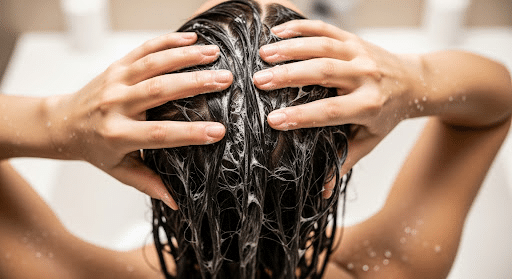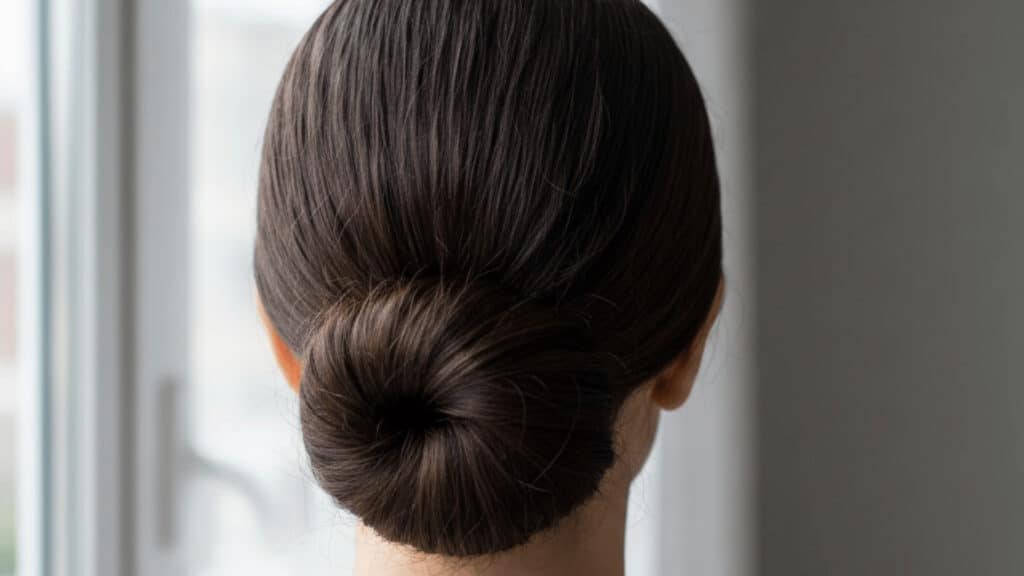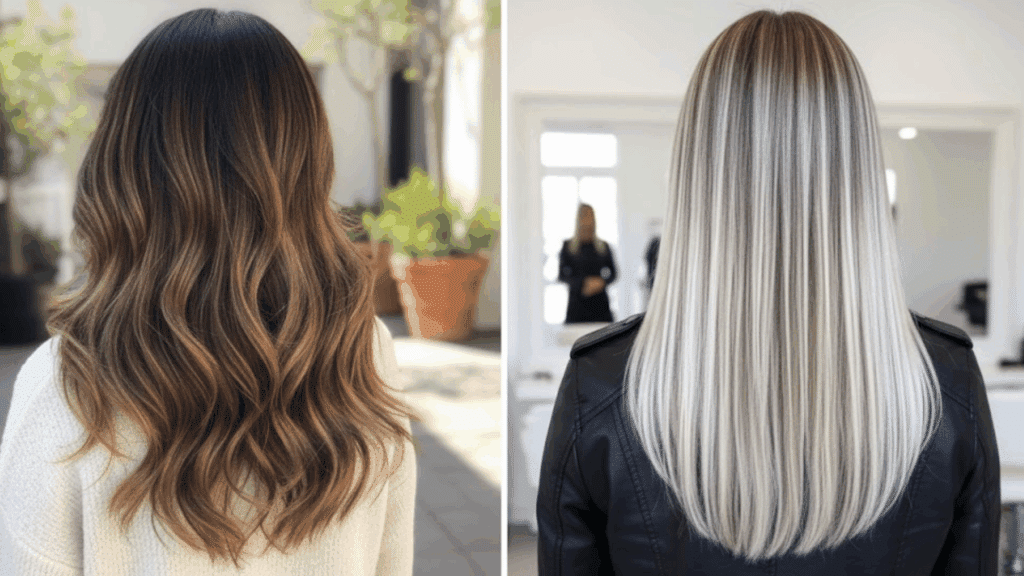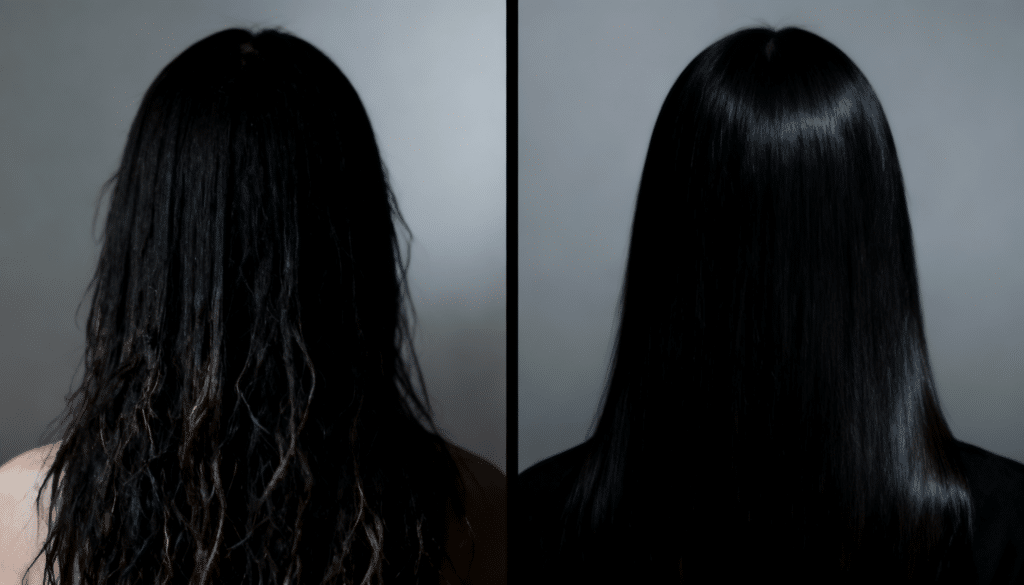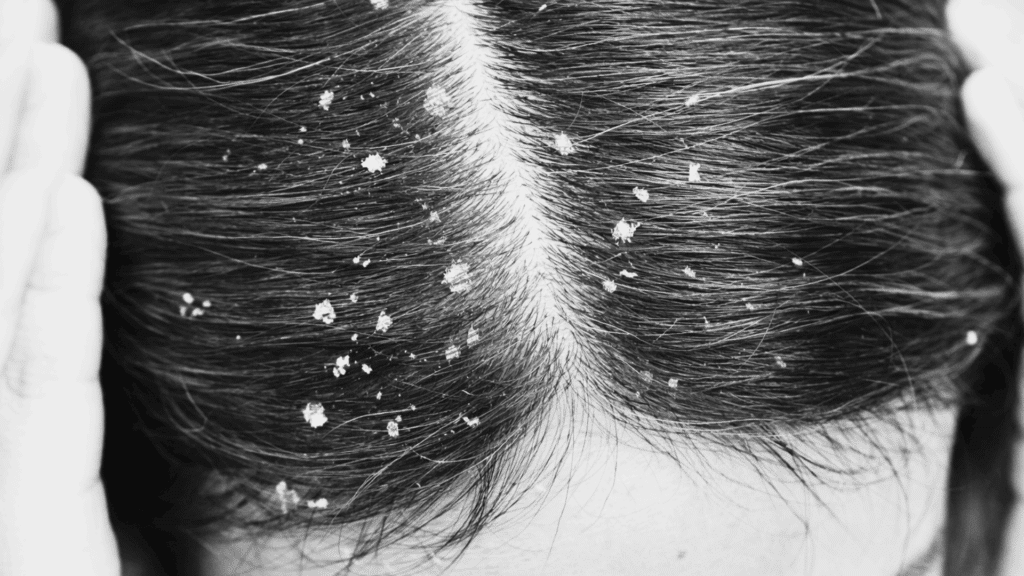I get it, you’ve probably heard mixed things about using Epsom salt on your hair. Some people swear it’s a miracle treatment for volume and scalp health, while others warn it’ll leave your hair feeling like straw.
The truth is, Epsom salt can be both helpful and harmful depending on how you use it. I’m going to break down exactly when it works, when it doesn’t, and how to use it safely.
In this blog, I’ll cover, is epsom salt bad for your hair, the benefits and drawbacks you should know about, plus step-by-step instructions for using it without damaging your strands. Let’s clear up the confusion once and for all.
What is Epsom Salt?
Epsom salt isn’t salt at all; it’s magnesium sulfate, a mineral compound.
It got its name from Epsom, England, where it was first discovered in natural springs. You’ll find it as white, crystalline granules that dissolve easily in water.
Most people know Epsom salt for those relaxing bath soaks that help sore muscles. But the thing is, it’s also become popular in hair care routines.
The magnesium and sulfate work together to remove product buildup and add volume to flat hair. However, it’s pretty harsh stuff, so understanding what you’re working with is crucial before you start sprinkling it on your scalp
Can One Wash Hair with Epsom Salt?
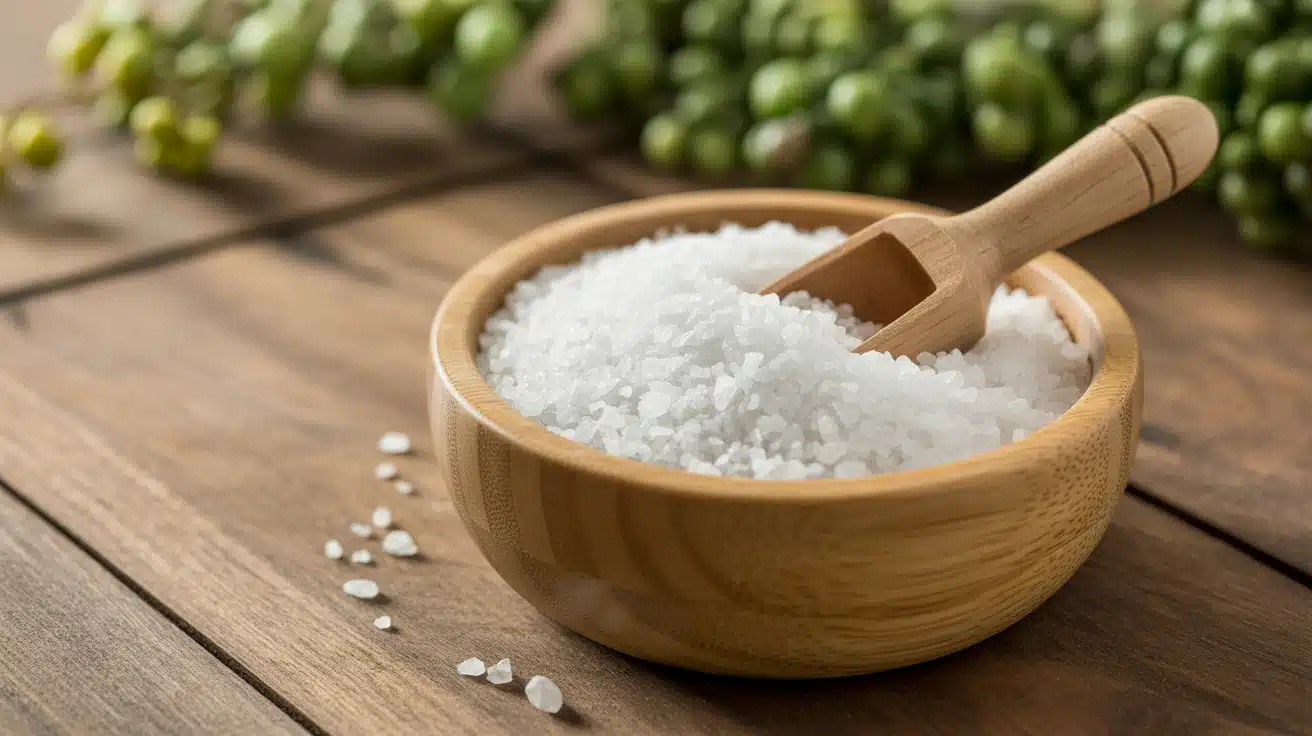
Yes, you can wash your hair with Epsom salt, but it’s not something I’d recommend doing regularly.
Epsom salt acts like a clarifying agent; it strips away oils, product buildup. It also strips away some of the natural moisture your hair needs to stay healthy.
When you use salt as a hair wash, it essentially deep-cleans your scalp and strands. Some people love how voluminous and clean their hair feels afterward.
But the salt is incredibly drying. If you have color-treated, damaged, or naturally dry hair, a salt wash can leave you with brittle, frizzy strands that are harder to manage than before you started.
User Experiences of Epsom Salt for Hair Care
Many people wonder about the long-term effects of regular Epsom salt baths on their hair.
One reader on Reddit with fine, straight hair noticed texture changes after frequent soaks for muscle relief, especially while on medication that might cause thinning.
Another experienced user confirms that Epsom salt can be drying initially but offers valuable benefits like hair strengthening, scalp cleansing, and potentially supporting hair growth and color restoration. The key is thorough rinsing after exposure.
She emphasizes that proper cleansing and moisturizing afterward prevent the dryness that many people experience with Epsom salt use.
Drawbacks: Is Epsom Salt Bad for Your Hair

While Epsom salt has its benefits, it’s not all sunshine and rainbows. There are some serious downsides you need to consider before making it part of your routine. The following are the answer to is epsom salt bad for your hair
1. Causes Excessive Dryness
Epsom salt strips away natural oils that your hair desperately needs to stay moisturized. This can leave your strands feeling rough and brittle.
The drying effect is particularly harsh on already damaged or chemically treated hair. Without proper moisture, your hair becomes more prone to breakage and split ends.
You might notice your hair feeling like straw after repeated use.
2. Strips Hair Color
If you’ve invested in hair color, Epsom salt can fade it faster than you’d like. The harsh cleansing action doesn’t discriminate between buildup and color molecules.
This means your expensive highlights or vibrant dye job could wash down the drain. Color-treated hair is already more porous and vulnerable.
Using Epsom salt regularly can significantly reduce the longevity of your color investment.
3. Increases Breakage Risk
The rough texture of Epsom salt can create microscopic tears in your hair cuticle. This weakens the hair shaft and makes it more susceptible to snapping.
Over time, this mechanical damage accumulates and leads to noticeable breakage. Fine or fragile hair is especially at risk. You might start seeing more hair in your brush or shorter pieces sticking up around your hairline.
4. Disrupts Natural pH Balance
Your scalp has a natural pH that keeps it healthy and balanced. Epsom salt can throw this delicate balance off course.
When your scalp’s pH is disrupted, it can lead to irritation, flakiness, or even increased oil production as your scalp tries to compensate. This creates a cycle where you feel like you need to wash more frequently, making the problem worse over time.
5. Causes Scalp Irritation
Some people experience redness, itching, or burning when using Epsom salt on their scalp. The crystalline structure can be too abrasive for sensitive skin.
If you have conditions like eczema or psoriasis, Epsom salt can trigger flare-ups. Even those with normal scalp sensitivity might notice discomfort. The irritation often gets worse with repeated use, making your scalp feel raw and uncomfortable.
Does Epsom Salt Help with Hair Growth?
The short answer is maybe, but it’s complicated. Salt doesn’t directly make your hair grow faster; that’s determined by genetics, hormones, and overall health. However, it can create conditions that support healthier hair growth.
When salt removes buildup from your scalp, it unclogs hair follicles that might be blocked by excess oil, dead skin, or product residue. This can help existing hair grow without obstruction.
Plus, the gentle exfoliation increases blood circulation to your scalp, which brings more nutrients to your hair follicles.
But here’s the reality check: if salt is drying out your hair and causing breakage, you’re essentially taking one step forward and two steps back.
Healthy hair growth requires a balanced scalp environment, not one that’s constantly stripped of moisture. So while salt might help indirectly, it’s not a magic growth solution.
The Benefits of Epsom Salt for Your Hair
Epsom salt on your hair might seem like an odd beauty hack, but there are some legitimate reasons why people swear by it.
Let me walk you through the main benefits that might make you want to give it a try.
1. Removes Product Buildup
Epsom salt works like a magnet for all that gunk sitting on your scalp and hair strands. You know that heavy feeling when you’ve been using too much dry shampoo, hairspray, or styling cream? That’s buildup.
The crystalline structure of Epsom salt helps lift away these residues that regular shampoo sometimes leaves behind.
2. Adds Natural Volume
If you’re dealing with flat, lifeless hair, Epsom salt might be your new best friend. By removing excess oils and product residue from your roots it creates space between hair strands, which translates to more volume.
The salt also slightly roughens the hair cuticle, which gives individual strands more grip and texture. This means your hair holds styles better and looks fuller from root to tip.
3. Exfoliates the Scalp
Your scalp needs exfoliation just like the rest of your skin, and Epsom salt provides gentle physical exfoliation that removes dead skin cells.
The granules help stimulate blood circulation when you massage them in, which can promote better nutrient delivery to your hair follicles.
Plus, clearing away dead skin and excess oil creates a cleaner environment for new hair growth to thrive.
4. Balances Oily Scalp
For those struggling with greasy roots that seem impossible to control, Epsom salt can help regulate oil production. It absorbs excess sebum without completely stripping your scalp of its natural protective oils.
This creates a more balanced environment that doesn’t trigger your sebaceous glands to go into overdrive. Many people find they can go longer between washes after incorporating Epsom salt treatments into their routine.
5. May Reduce Dandruff
The antifungal properties of magnesium sulfate can help address some types of dandruff caused by fungal overgrowth on the scalp.
Additionally, the exfoliating action helps remove flaky, dead skin that contributes to visible dandruff. While it’s not a cure-all for severe scalp conditions, many people notice reduced flaking and itching after regular use.
How to Use Epsom Salt on Your Hair for Each Hair Type
Not all hair types can handle Epsom salt the same way. What works for oily hair might be a disaster for dry strands. Here’s how to tailor your approach based on your specific hair needs.
1. Oily Hair
The following are steps to use Epsom salt on oily hair.
- Mix 2 tablespoons of Epsom salt with your regular shampoo
- Massage gently into wet hair and scalp for 30 seconds. Rinse thoroughly with cool water
- Follow with a lightweight conditioner on the ends only.
Use this mixture once a week at most. The salt will help control excess oil production and remove stubborn buildup that regular shampoo misses.
2. Dry Hair
The following are steps to use Epsom salt on dry hair.
- Mix 1 tablespoon with a moisturizing shampoo.
- Focus the application on the scalp area only, avoiding the hair lengths.
- Rinse immediately and follow with a deep conditioning treatment.
Consider doing a pre-treatment with oil before using the salt mixture. Your hair needs extra protection from the drying effects. Use Epsom salt very sparingly, only once a month at most.
3. Normal Hair
The following are steps to use Epsom salt on normal hair.
- Combine 1.5 tablespoons of Epsom salt with your usual shampoo.
- Apply to wet hair and massage gently for about 20 seconds.
- Rinse well and condition as normal.
You can do this every two weeks. This frequency helps maintain clean hair without overdoing it. You can adjust the timing based on how your hair responds. Monitor for any signs of dryness or irritation.
4. Curly Hair
The following are steps to use Epsom salt on curly hair.
- Mix 1 tablespoon with a sulfate-free shampoo.
- Apply to scalp only, using fingertips rather than scrubbing motions.
- Rinse thoroughly and follow with a heavy moisturizing conditioner or mask.
Curly hair is naturally drier, so use Epsom salt only once a month. Consider doing a protein treatment afterward since curls are more fragile and prone to damage from harsh ingredients.
5. Color-Treated Hair
The following are steps to use Epsom salt on color-treated hair.
- Mix just 1 teaspoon with color-safe shampoo monthly.
- Apply only to the roots and scalp area.
- Rinse with cool water to help seal the hair cuticle.
- Always follow with a color-protecting conditioner.
Avoid Epsom salt for the first 4-6 weeks after coloring. The salt can strip color faster, so less is more in this case.
Alternatives to Epsom Salt for Hair Care
If Epsom salt seems too harsh for your hair type, don’t worry, there are plenty of gentler alternatives that can give you similar benefits. These options can help you achieve clean, voluminous hair without the potential damage.
| Alternative | Main Benefits | Best For | How to Use |
|---|---|---|---|
| Apple Cider Vinegar | Removes buildup, balances pH, adds shine | All hair types, especially oily scalp | Mix 1-2 tbsp with water, use as final rinse |
| Baking Soda | Deep cleanses, removes product buildup | Oily hair, occasional clarifying | Mix with shampoo, use once weekly max |
| Sea Salt Spray | Adds texture and volume | Fine hair, beachy waves | Spray on damp hair, scrunch, and air dry |
| Bentonite Clay | Detoxifies scalp, absorbs excess oil | Oily scalp, sensitive skin | Mix with water, apply as a mask for 15 minutes |
| Clarifying Shampoo | Removes buildup gently | All hair types | Use 1-2 times per month in place of regular shampoo |
| Rice Water | Strengthens hair, adds shine | Damaged or weak hair | Ferment rice water, use as a rinse after shampooing |
| Witch Hazel | Soothes scalp, controls oil | Irritated or oily scalp | Apply with cotton pad to scalp, don’t rinse |
The Bottom Line
So there you have it, the complete truth about Epsom salt and your hair. It’s not a miracle cure, but it’s not a hair disaster either when used smartly.
Is Epsom salt bad for your hair? The key is knowing your hair type and being honest about what it can handle. If you’ve got oily, resilient hair, go ahead and give it a try.
But if your strands are already struggling with dryness or damage, you’re better off sticking to gentler alternatives. Remember, healthy hair doesn’t happen overnight, and there’s no single product that works for everyone.
Listen to what your hair is telling you. If it feels good after using Epsom salt, great. If not, there are plenty of other options to use.
Your hair will thank you for being thoughtful about what you put on it.



